
Canada has expressed measured confidence in the face of a growing outbreak of the Ebola virus, which has now spread to four African nations and sent other countries scrambling to prepare for its potential arrival. Prime Minister Stephen Harper told reporters this week that the Ebola virus outbreak, which has claimed more than 720 lives since it was first reported in March, is a major epidemic and while Canadian officials are concerned, the risk of it spreading to Canada is low.
"There is a plan and there are protocols which are not that different from how we deal with a lot of issues," Dr. Eleni Galanis, a physician epidemiologist with the B.C. Centre for Disease Control, told Yahoo Canada News. "Obviously Ebola is a concern because it is so highly fatal, 90 per cent of patients die, so there is a heightened concern about it. But in general, the cases in the outbreak have been very much isolated to the affected communities and countries in Africa. The risk to Canadians, and the risk of exportation, is very low."While that may be the case, other Western nations have mounted a more vigorous response to the threat of an Ebola spread and Canadian health officials have followed suit.The Telegraph reports that a British emergency planning committee has readied itself to introduce additional precautions should the likeliness of Ebola reaching the country increase. In America, the realities of an Ebola spread have already taken root. Two U.S. health care workers were infected by the virus while working in Liberia, though no cases have been reported on U.S. soil. Experts told ABC News that it was likely that at least one person infected with Ebola will travel to America during the outbreak. A spokesman for the Center of Disease Control and Prevention said that regardless of the likelihood of its arrival, health officials were prepared to stop it from spreading.
Dr. Jay Keystone, who works in the tropical diseases unit of Toronto General Hospital, said this Ebola outbreak is the worst the world has seen.
"It's different because it is crossing borders, because it is central cities instead of villages," he told CBC News. "In a village you get an outbreak, it kills most of the patients, everybody leaves and it is over. Now we are in cities, it is now moving cross-border. People are hiding their cases."
The outbreak has so far been confined to Africa but continues to spread, with 122 new cases and 57 additional deaths being reported on Thursday. According to the latest information from the World Health Organization, there are now 1,323 infected patients and 729 casualties across four African nations. Numbers released on Thursday place Guinea, Libera and Sierra Leone at the epicenter of the outbreak. Guinea has a total 460 suspected or confirmed cases and 339 deaths; Liberal has 329 reported cases and 156 deaths, and Sierra Leone has 533 cases and 233 deaths. Nigeria also confirmed one fatal case of Ebola, in a civil servant who flew into the country after working in Liberia.
“The scale of the Ebola outbreak, and the persistent threat it poses, requires WHO and Guinea, Liberia and Sierra Leone to take the response to a new level and this will require increased resources, in-country medical expertise, regional preparedness and coordination,” WHO Director-General Margaret Chan said, according to the Associated Press.
Dr. Gregory Taylor, Canada’s deputy chief public health officer, says every point of entry into Canada is subject to quarantine inspection, via the Quarantine Act. Travellers are required to report any illness and airport authorities are ordered to identify any passengers they suspect of being sick.
This plan is far from infallible, however. For one, it relies on visual identification of potential illness, as well a person's willingness or ability to identify themselves as a potential case.
"It would be impossible to identify all people potentially exposed to a disease infecting hundreds of millions of people worldwide. In addition, people with asymptomatic infections would still slip through a quarantine net," he wrote.
He further noted that when SARS hit Toronto, compliance (those who willingly engaged in the quarantine process) was no higher than 57 per cent.
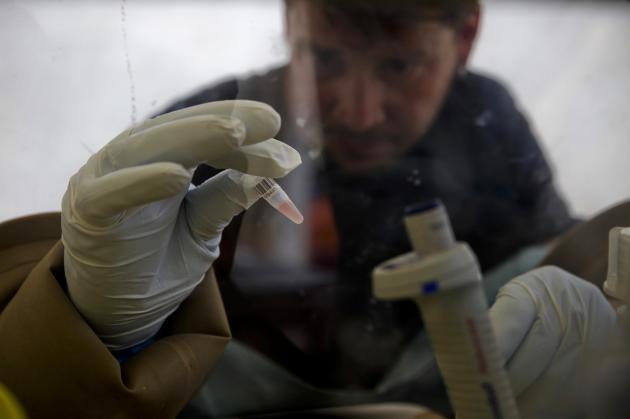
A scientist separates blood cells from plasma cells to isolate any Ebola RNA in order to test for the virus at the European Mobile Laboratory in Gueckedou April 3, 2014.
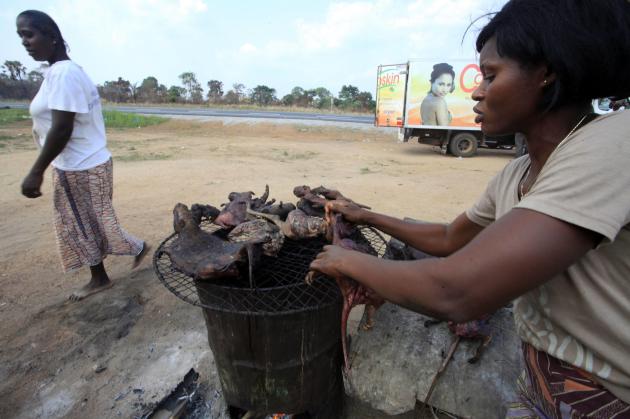
A woman dries bushmeat near a road of the Yamoussoukro highway March 29, 2014. Bushmeat - from bats to antelopes, squirrels, porcupines and monkeys - has long held pride of place on family menus in West and Central Africa, whether stewed, smoked or roasted. Experts who have studied the Ebola virus from its discovery in 1976 in Democratic Republic of Congo, then Zaire, say its suspected origin - what they call the reservoir host - is forest bats. Links have also been made to the carcasses of freshly slaughtered animals consumed as bushmeat.
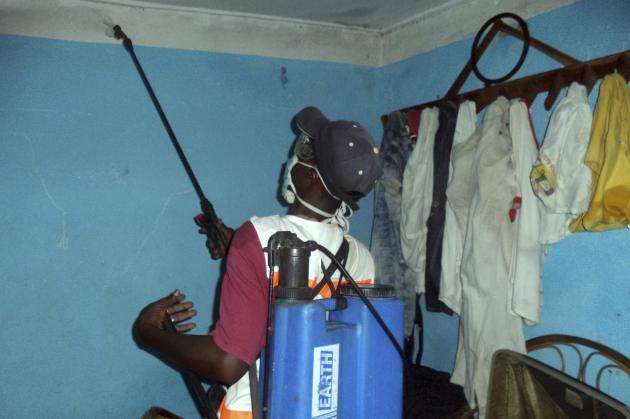
A health worker sprays disinfectant in a house belonging to someone suspected of coming into contact with Ebola virus in Macenta March 26, 2014 in this picture provided by Plan International.
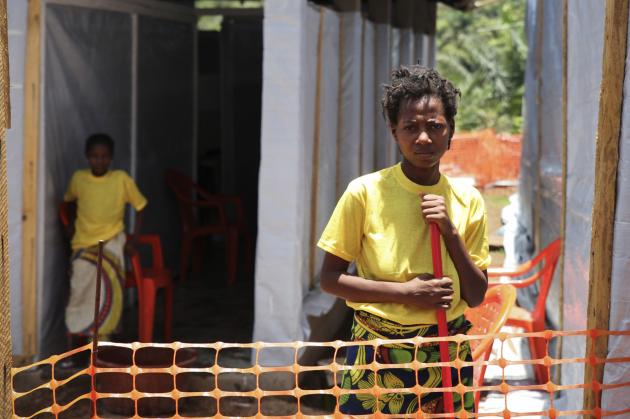
Rose Komono poses for a picture at a health clinic after overcoming the Ebola virus in Gueckedou April 3, 2014. On Saturday, Komono became the first victim to have beaten the disease in the region of Gueckedou, which has borne the brunt of the deaths in the impoverished West African nation. A market town of 220,000 people near the Liberia and Sierra Leone borders, Gueckedou's makeshift clinic is on the front line of Guinea's battle to contain its first outbreak of the haemorrhagic fever, normally found in Central Africa. Picture taken April 3, 2014.
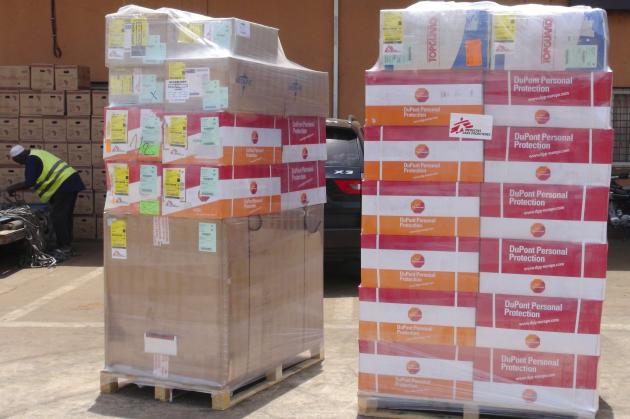
Workers from Doctors Without Borders unload emergency medical supplies to deal with an Ebola outbreak in Conakry, Guinea, March 23, 2014.
Hiccups, say doctors in this remote corner of Guinea, are the final tell-tale sign of infection by the Ebola virus that has killed more than 100 people since an outbreak began this year. Then comes profuse bleeding, circulatory shock and death. In total, 98 people are thought to have died from the disease in Guinea and 10 more in neighbouring Liberia, according to aid workers and governments. A market town of 220,000 people near the Liberia and Sierra Leone borders, Gueckedou's makeshift clinic is on the front line of Guinea's battle to contain its first outbreak of the haemorrhagic fever, normally found in Central Africa.
That is where our health system kicks in. According to the national public health agency, Canadian hospitals have sophisticated infection control system in place to limit the spread of infection.
For the most part, a theoretical Canadian response to the discovery of an Ebola patient inside Canada would be governed by the Canadian Contingency Plan for Viral Hemorrhagic Fevers It would follow a series of steps. First, those returning from a high-risk area would be identified and asked to watch for symptoms of Ebola (fever and vomiting) for three weeks. If symptoms present themselves in that time, they would be placed in isolation at hospital and receive healthcare support, in the hopes their immune system could recover.
Meantime, health agency officials would do what is called "contact tracing" – essentially retracing the patient's steps to determine who they had contact with and who may have contracted the virus. The spread of Ebola requires direct contact, either through broken skin, blood or vomit, for example, so those who get sick are most often those who are treating the sick, such as health care workers or family members. The people who had contact with the patient are monitored for symptoms, and the process repeats itself. Every single case is reported upward, meaning provincial hospitals contact federal health officials, who contact the World Health Organization.
"In the case of a disease like Ebola, one case is considered an outbreak. The full mechanism responds quite aggressively to contain the situation," said Dr. Galanis.
Dr Keystone, the tropical disease expert at Toronto General Hospital, noted that in previous Canadian outbreaks of cases comparable to Ebola, most of the people infected are paramedics and emergency room doctors, who are subjected to an infected patient before the issue is clear. After that, Canada's impressive oversight network has been able to limit the spread.
"So far (the Ebola outbreak) has really been confined to Africa. It's not a big problem for us at the moment, and hopefully, not ever."
Don't worry Canada, our healthcare system will protect us. That's why we pay those humongous taxes.
No comments:
Post a Comment
Through this ever open gate
None come too early
None too late
Thanks for dropping in ... the PICs